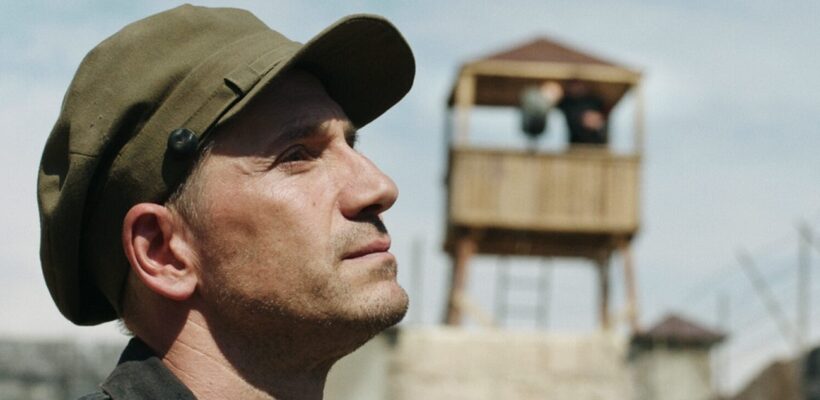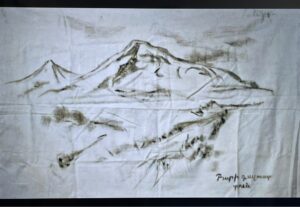
Michael A. Goorjian Inspires Hope Through His Film Amerikatsi
4 min readSlated to Speak at AUA’s Bay Area Gala
A recent masterpiece by Michael A. Goorjian, Amerikatsi, narrates the age-old Armenian chronicles of persecution and perseverance through the uncommon perspective of a Diaspora Armenian.
Set in the 1940s, Amerikatsi depicts the experiences of Charlie, an Armenian Genocide survivor who repatriates to Soviet Armenia from the United States. Once there, he finds himself in a situation far from the one he had envisioned finding in his motherland.
He is imprisoned for unsubstantiated crimes committed against communism and placed in solitary confinement in a prison cell. Absent any human interaction day after day, Charlie clings to joy by living vicariously through the lives of others in the prison whose lives he witnesses by peering into an open window across from his cell.
Through non-verbal interactions, he befriends a prison guard, but that friendship also ends in heartbreak. As the story unfolds, the audience feels a range of emotions, from comedic relief to gut-wrenching blows. Above all, the film’s takeaway is overcoming adversity through strength, unwavering faith, and loyalty to the homeland, despite persistent challenges — ideas that many Armenians themselves, including those in the Diaspora, ponder today.
Goorjian, half-Armenian on his father’s side and half-Scottish on his mother’s, dedicated the film to his grandfather, Manoog Goorjian. From Palu, he and Goorjian’s grandmother, from Erzurum, were both survivors of the Armenian Genocide. Immigrating separately to the United States, they met in Niagara Falls and were united in an arranged marriage. They then moved to San Francisco, where they raised their two sons, including Michael’s father.
“Growing up, I didn’t have much of a connection to my Armenian heritage, beyond being baptized at St. Gregory’s and interacting with my Armenian relatives,” Goorjian reflects. With his upbringing as a “California kid,” it wasn’t until after high school, when he enrolled in the University of California, Los Angeles, and started working as an actor that he began to cross paths and interact with more Armenians in the Los Angeles area.
This snowballed into a desire to embrace his heritage, and in 2016, he visited Armenia for the first time, in what he describes as a “profound experience” that triggered a longing to work on a project that he could create in his own voice.
“I wanted to make something that wasn’t necessarily focused on the Genocide, which is an incredibly important subject, but I wanted to find something that had the ability to have depth but also be hopeful and, more than that, be joyful to watch,” Goorjian comments, adding that he vowed then, “I’m going to make a film in Armenia. I promise.” With Amerikatsi, he was able to do just that: he created a joyful film that Armenians and non-Armenians alike could relate to, a story with which everyone could connect. In 2018, Goorjian returned to Armenia to begin scouting around for the film, and despite the many challenges brought on by the Covid-19 pandemic, he was successful in completing the film. Acclaiming Armenia as a filmmaking destination, Goorjian praises the immense talent harbored in the country, from actors and artists to musicians and technical crew, and speaks to the importance of publicizing this talent with Diaspora’s help and promoting Armenia as a hub for this craft simply by producing more and more good films there. “The most important thing in a film are the voices. Filmmaking is a version of writing and painting, where we need individual artists’ voices that are good, that people will want to see or hear,” he asserts.
Goorjian is slated to speak at Vision for the Future: Advancing Higher Education in Armenia, a special event in the Bay Area benefitting the Build a Better Future With AUA capital campaign. The campaign will support the expansion of the American University of Armenia (AUA) campus, which will be launched soon with the construction of three new buildings, one of which will be the Arts building to be named the “Paruyr Sevak Building.”
He acknowledges that Armenia has an incredibly rich and deep culture and history, and part of the role of artists and creators, generally speaking, is to be aware of that, learn about, and embody it in ourselves as much as possible. “We don’t need to replicate, but instead, to ingest existing art, take it in, and then use it to create new art that will carry the evolution of our culture,” Goorjian comments, adding that the past two centuries have been very difficult for our nation, considering the oppression and terrible acts carried out against us: “It’s natural to want to maintain the past, but along with that, it is important to build upon the foundation so that in future periods of rebirth, we can look back and remember. That would be my hope for the future of the arts in Armenia, and AUA’s efforts are an incredible step forward in that direction.”
Despite the film having many factual aspects, Amerikatsi was not meant to be a historical rendition, but rather, a fable. “As an artist and writer, I gravitate toward stories that are about humanity, about the human condition, that are as universal as possible,” Goorjian remarks. At the end of the film, despite all the hardships he endures, Charlie makes the decision to remain in Armenia. The scene plays out in the apartment that he comes to call home, with the backdrop of a canvas depicting Mount Ararat and the words “welcome home” in Armenian. “That apartment, symbolically, was the home he created that was Armenia, and to me, that apartment is everywhere. For Armenians, we’ve created homes all over the globe, but we’re rooted in Armenia,” Goorjian remarks, noting that even Mount Ararat isn’t in Armenia anymore, but it’s still and will always be our home.
Concluding with a message of hope and encouragement, Goorjian states: “As an artist, I can just try to remind us of what we innately have, which is our culture, and our culture is everywhere. I think there’s great significance in that fact. The fact that we have land, that we have a country, is extremely important and worth fighting for to keep and maintain. As far as geopolitics goes, I have no idea what is right or wrong, but I do know that our home exists, our culture will continue to exist, and despite all of the disappointments and pain, we have to remember that.”
Amerikatsi continues to play in theaters and is also available for streaming online. For tickets or more information about AUA’s upcoming event, visit https://babf.aua.am/vision-for-the-future/.
Founded in 1991, the American University of Armenia (AUA) is a private, independent university located in Yerevan, Armenia, affiliated with the University of California, and accredited by the WASC Senior College and University Commission in the United States. AUA provides local and international students with Western-style education through top-quality undergraduate and graduate degree and certificate programs, promotes research and innovation, encourages civic engagement and community service, and fosters democratic values. AUA’s Office of Development stewards the University’s philanthropic efforts exclusively for educational purposes.


